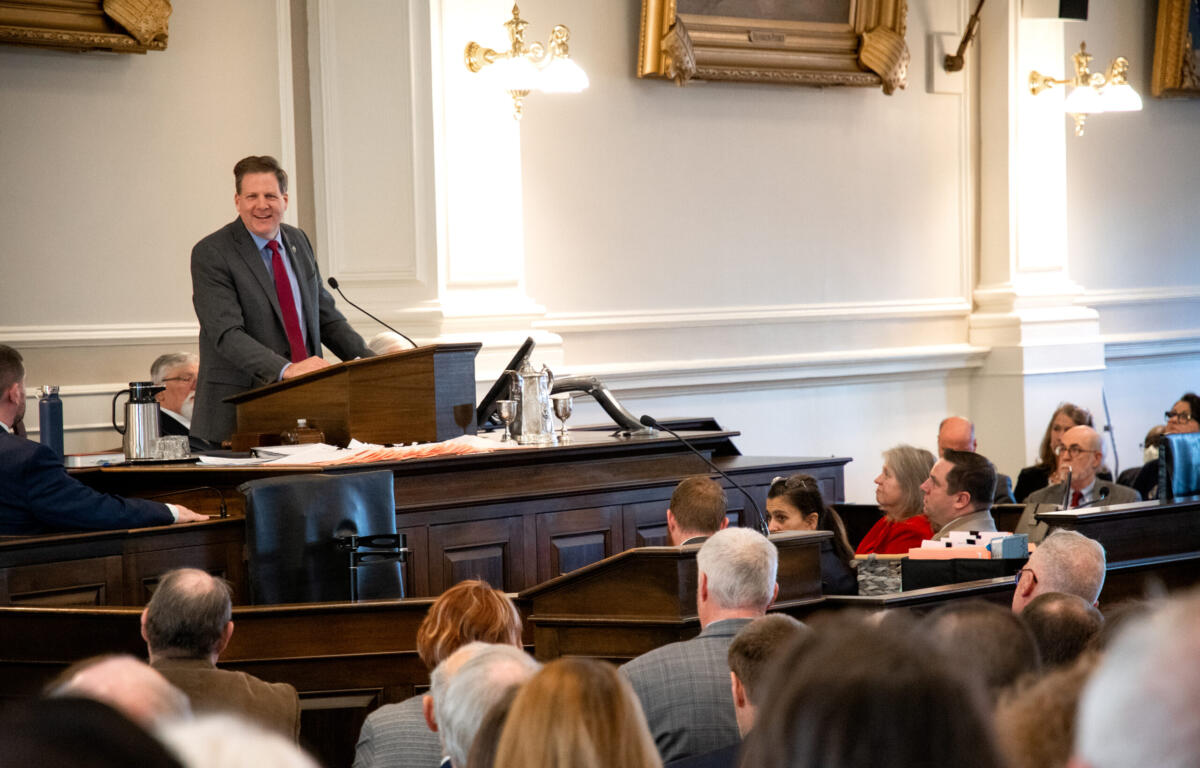KEENE, NH – New Hampshire’s Governor Chris Sununu has delivered his 2023 budget address.
In his address, Sununu, a republican, called the recommended budget fiscally responsible, and said it imposes no new taxes or fees on Granite Staters.
“This budget focuses on three key areas: Our workforce, who work tirelessly to run the most efficient government in the country; our kids, who are the future of this state; and our property taxpayers,” Sununu said. “Simply put — this budget prioritizes people over programs.”
Sununu said that New Hampshire will soon have fully phased out the interest in dividends tax, and his budget recommends the complete elimination of the 7% consumer communication services tax, calling it outdated.
The recommended budget includes numerous investments in education. Sununu is recommending significant adjustments to the Education Funding Formula to simplify it, and would like to send $200 million over the next two years, and $1 billion over the next 10 years to school districts who need the most aid, and to help offset property taxes. Sununu said that will also increase funding for charter schools and double the opportunities in Education Freedom Accounts. He’s also proposing $75 million from the Education Trust Fund surplus to invest in school building aid, and $5 million for computer science curriculum, as he says there are virtually no jobs students will go into in the future that don’t require some level of computer comprehension. He’d also like to allocate $2 million to develop and update a New Hampshire based civics curriculum.
In his last recommended allocation for education, this week Sununu is establishing a commission tasked with allocating funding for a Christa McAuliffe statue at the Statehouse, to honor her dedication to the state and inspire students.
Outside of the classroom, Sununu turned his attention to mental health services. Sununu said the demand for such services for adults and children remains high, so his recommended budget continues to support Hampstead Hospital, invests $2 million dollars into family resource centers, includes a plan for student debt relief, and utilizes state opioid grants, and doubles the efforts of the Recover Friendly Workplace Initiative.
The budget also acknowledges healthcare workers and proposes an across-the-board Medicaid rate increase to help recruit and maintain workers.
Moving on to the Housing crunch, Sununu announced an additional $30 million dollars for his InvestNH housing program to help meet demand, $25 million for the Affordable Housing Fund to help construct and rehabilitate affordable housing for low- and moderate-income families, and $8.4 million to the Department of Military and Veterans Services.
Sununu said he’s very careful not to use one-time funds for long-term programs. With that, he’d like to allocate $180 million to the state’s rainy day surplus fund by the end of fiscal year 2025.
Finally, Sununu turned his attention to the workforce and small businesses. In an effort to help incentivize workers to move here, Sununu proposed a new Universal License Recognition program, which will allow people who are licensed in various professions who are in good standing in other states to be licensed in New Hampshire on day one. He would also like to fully remove 34 licenses he feels are outdated, 14 underutilized regulatory boards, and almost 700 statutory provisions. Sununu would also like to establish an independent office of Regulatory Review in Government Efficiency to streamline state government and make it more efficient.
““This budget reminds businesses across this country that New Hampshire remains a hub of innovation,” Sununu said. “Here in the Granite State, we listen to and work with the businesses that are the bedrock of our communities. After years of cutting thousands of pieces of big government red tape, we continue to find efficiencies and streamline improvements to the Office of Professional Licensure and Certification.”
In closing, Sununu reiterated his recommended budget puts “people over programs” and that he believes it is fiscally responsible, and said he looks forward to working with the legislature.
“Washington is broken. They cannot balance a budget, and they can barely manage to fund the government — but that’s not how we do it in New Hampshire,” Sununu said. “Our citizens demand accountability and transparency — and that’s what we are going to continue to deliver.”
Following the address, New Hampshire’s Democratic Party issued a statement, calling the budget “the worst chocolate in the assortment.”
NHDP Chair Ray Buckley is unhappy with the investments in education recommended in the budget.
“This budget pumps even more taxpayer money into private and religious schools that operate with zero oversight, pushes ever more property tax burdens onto local towns and municipalities, and relies on magic thinking and cocktail napkin math to solve our housing crisis instead of pragmatic policy solutions.”
The budget does not touch on women’s health or reproductive healthcare, which Buckley says leave’s Granite State women in the position of wondering when state law may change.




